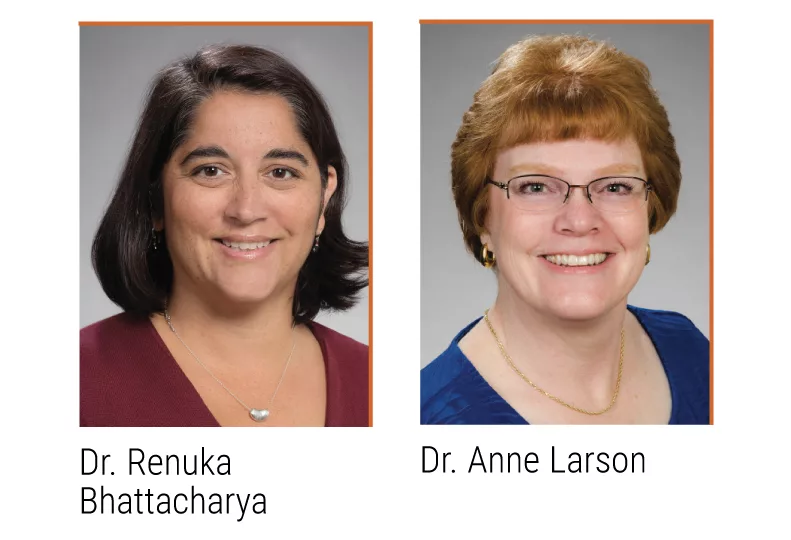UW satellite clinic offers liver treatment services
Providers partner with local doctors, provide consultations

Two liver specialists with the University of Washington say they’ve provided liver treatment consultations to over 200 patients with acute and chronic liver disorders throughout the university’s year-old medicine-liver clinic in Spokane and have plans to expand to other parts of the state to provide greater access to patients.
The clinic, which was established in the area about a year ago, is the third such clinic in Washington, says Dr. Renuka Bhattacharya, medical director of UW’s liver transplant program and an associate professor of gastroenterology.
“It really had been a very long-standing goal, an ongoing effort literally over the past decade,” she says. “We ran into various barriers, whether it be on the hospital administrative level and just a practical level of how many doctors do we have and who can go out there?”
The other two clinics are in Seattle and Bellevue.
She adds, “It’s multiple moving parts. … there have been ongoing meetings and discussions, so it’s very exciting to have it come to fruition.”
The clinic is located at 907 S. Perry, in Spokane’s South Perry District. About 1,600 square feet is dedicated clinic space, and about 2,500 square feet is dedicated to operating space.
Bhattacharya adds that Spokane has been a hub for medical care for years, and its central location makes it an ideal location to also serve patients from Idaho and Montana.
She says, “We thought that Spokane was central, geographically, including for the Tri-Cities patients. I’ve been surprised that patients who are halfway between here (Seattle) and Spokane would much rather head east than west.”
She adds, “It’s a combination of already a very robust health system in Spokane with whom we like to interface and have a history with, and also the geography.”
Dr. Anne Larson, chief of UW Medicine’s Northwest Hepatology Clinic and a professor of medicine at UW, says it’s also financially burdensome for patients to travel to Seattle regularly to receive treatment, so having a clinic on the eastern side of the state is beneficial for a number of patients.
The two providers travel to the clinic about once a month and are able to see on average about 16 new patients a visit between the two, Larson says.
She says, “Initially, patients all had to come to Seattle, especially for liver transplant services. Providence has put in place a liver specialist as well over the last couple of years, but the volume of patients is more than they can handle alone. We’ve been an established program since 1990, so we wanted to make sure we offer those services to people as well.”
Bhattacharya says, “It’s really a consultative service. We are there to partner with the gastroenterology liver and primary-care providers who are taking care of these patients. We provide consultations as well as, for some patients, ongoing follow-ups.”
She notes the clinic is not a primary-care clinic, and most tests are not performed onsite. Instead, the physician’s partner with a patient’s primary care provider and area specialists for additional needed testing.
Several liver treatment services are available at the clinic, including hepatology, transplant and evaluation, pre- and post-liver transplant care, and liver disease treatments.
Hepatology is the study of liver, gallbladder, biliary tree, and pancreas, as well as the management of disorders of those organs.
“We’re able to manage patients with complicated liver injuries,” Larson says. Cirrhosis, for example, is treated at the clinic. Cirrhosis is a condition where the liver no longer functions properly due to long-term damage where normal tissue is replaced over time by scar tissue.
She adds, “Any patient that has cirrhosis from any of the numerous causes of it and if they’re in liver failure, they usually need quite a bit of management for all of those complications.”
Currently, the clinic is only open on Monday and Tuesday from 8 a.m. to 5 p.m. The clinic has five employees, which includes the two physicians, a physician assistant, and two administrative personnel.
From an education standpoint, Bhattacharya says the pair are open to providing shadowing or observer-ship opportunities to medical students, but the clinic doesn’t currently have any students working with them.
“We had some preliminary discussions about that, and we’re very open to it. That’s an important part of our education mission,” she says.
Larson says that the program would like to open more clinics in the future. The duo has their sights set on Olympia, to provide services to the lower half of the state, but don’t have a concrete timeline as to when that clinic will be established.
She says, “I think the COVID epidemic is throwing us back a bit.”
Related Articles
Related Products

_c.webp?t=1763626051)

_web.webp?t=1764835652)
